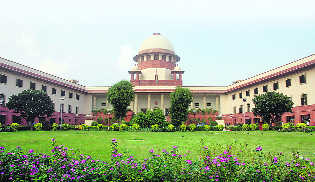
Satya Prakash
As Law Minister, neither I nor my department will remain a post office. We have a stake and we will continue to pursue that stake in consultation with the Supreme Court and High Courts,” said Ravi Shankar Prasad in his first interaction with the media after taking over as the Union Law Minister.
The Law Minister’s assertion — which has been taken as a statement of intent of the newly elected government — sets the tone for relationship between the Executive and the Judiciary during Modi 2.0. It reflects the confidence of an Executive unwilling to cede further ground to the Judiciary which has been on the back foot in the recent past due to infighting among the top court judges and allegations of sexual harassment against Chief Justice of India Ranjan Gogoi.
On the face of it, the Law Minister’s statement is about judicial appointments. But there are several outstanding issues on which the Executive and the Judiciary are not on the same page. Be it Memorandum of Procedure (MoP) for appointment of judges or judicial overreach — the tension often results into face-offs as the government sits over recommendations of the Supreme Court Collegium.
The recent decision of the government to ignore the Collegium’s recommendation to appoint Justice AA Kureshi as Chief Justice of the Madhya Pradesh High Court and instead notifying the appointment of Justice Ravi Shankar Jha as the Acting Chief Justice of the high court is the latest example.
Mainly, there are four issues — Judicial appointments, MoP, All India Judicial Service and the problem of judicial overreach — on which the Executive and the Judiciary have been at loggerheads in the recent years.
The MoP prescribes the procedure to be followed by the government and the judiciary for appointment and transfer of judges of SC and HCs. While striking down the Constitution (Ninety-ninth Amendment) Act, 2014 and the National Judicial Appointments Commission Act, a five-judge Constitution Bench had in October 2015 asked the Centre to frame a new MoP in consultation with the CJI.
But things haven’t moved forward as the Collegium is not ready to accept the government’s demand to add national security and public interest as new grounds for rejection of appointments. The Collegium insists that the government can’t have a right to reject its recommendation.
But notwithstanding the logjam over MoP, judicial appointments have been speeded up. Barring a few appointments, including that of Justice KM Joseph, the two sides have largely been accommodative of each other, resulting in smoothening of appointments of judges to the Supreme Court and high courts. It was for this reason that after a decade there are no vacancies of judges in the top court.
The NDA government has been pitching for an All India Judicial Service for a centralised system of appointment of judges in subordinate courts where more than 5,000 posts of judges remain vacant. But things are stuck in the Supreme Court where several high courts and state governments have opposed the idea.
The Union Justice Secretary had in May 2017 written to the Supreme Court Secretary General suggesting a centralised examination to be conducted by a recruitment body such as the Union Public Service Commission for selection of judges in subordinate courts. The letter was converted into a PIL. Taking suo motu cognisance of the problem, a Bench headed by CJI Ranjan Gogoi had on October 22 last year asked high courts to expedite the recruitment process.
Above all, the larger issue of judicial overreach is likely to play out in Modi 2.0 when an assertive Executive is expected to attempt to regain the territory ceded to the Judiciary in the past few decades. Having tasted a judicial defeat in its attempt to gain a say in judicial appointments, will it revive the National Judicial Appointments Commission (NJAC)? It would be interesting to watch the government’s moves in the few months.



























